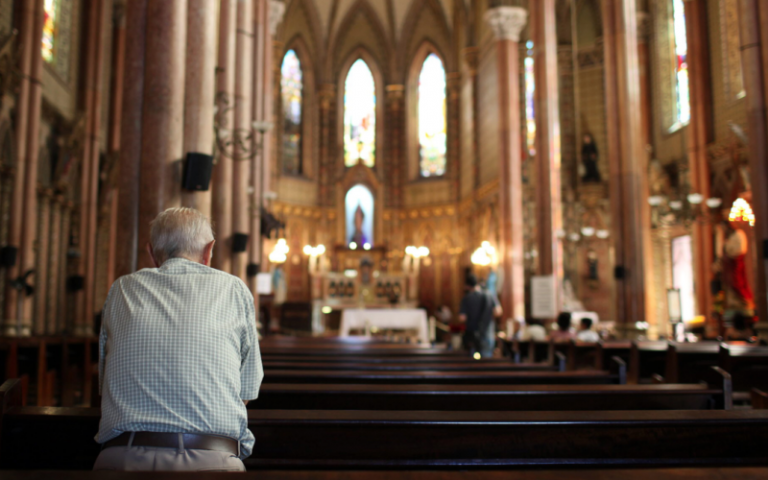Bishops in Illinois Plan to Work With Attorney General on Sex-Abuse Inquiry
August 29, 2018The Charity-to-Abortion Funding Pipeline
August 29, 2018
For people in the pews, things don’t look so great (CNS)
By Matthew Schmitz, Catholic Herald, 16 Aug 2018
Since 1968, Church leaders have tried to preserve a fragile truce. But repeated compromises have fostered a culture of deceit
After the allegations against Archbishop Theodore McCarrick, Cardinal Donald Wuerl told an interviewer: “I don’t think this is some massive, massive crisis.” Bishop Robert Barron has said that describing the priesthood as a “cesspool” would be “deeply unjust”.
Such claims miss the point. Men at the highest levels of the Church knew the rumours about McCarrick and took no action. As a result, the allegations have gravely damaged the credibility of the whole hierarchy. If bishops expect to be taken seriously as witnesses to Christ, the crisis is massive indeed – as the revelations from Pennsylvania underline.
Bishop Barron also cautioned against what he called an “ideological” response. According to the bishop, those who raise concerns about Humanae Vitae, priestly celibacy, or “rampant homosexuality in the Church” may be riding a “hobby horse” and causing a “distraction”.
No one cares for the endless Catholic culture wars, but we should be wary of attempts to shut down frank discussion of how we got here. Bishop Barron’s list of taboo topics suggests that he – like most bishops – is keen to preserve the settlement of 1968.
In that year, Pope Paul VI famously reaffirmed Catholic teaching on birth control in Humanae Vitae, but then declined to discipline the many bishops and priests who rejected that teaching. The result was an uneasy truce: the teaching was formally upheld, but obedience to it was not demanded.
The same dynamic played out in 2005, when the Vatican decided that men with “deep-seated homosexual tendencies” should be barred from the priesthood.
Countless bishops ignore this guidance; some even tolerate discreet romances. They only require that the priests not openly challenge Church teaching.
Both traditional and liberal Catholics are unhappy with this settlement. Under it, holiness and truth are sacrificed for a superficial peace. This arrangement is fair neither to the people who want to live by Church teaching, nor to those who would rather do without it.
Maintaining this truce makes sense if one is convinced that the post-Vatican II settlement is worth preserving. The McCarrick affair suggests that it is not.
Yes, conditions have improved in American seminaries. Yes, McCarrick’s reported offences occurred years ago. But they were known in 2000, when a delegation travelled to Rome to warn John Paul II of McCarrick’s crimes. They were known in 2002, when the American bishops put him forward as their spokesman on sex abuse. They were known when he retired to the grounds of a seminary, where he was attended by a string of young men. Whatever one’s view of the underlying moral matter, we must do away with the compromise that established this culture of lies.
We will not be able to begin real reform until we admit that the triumphalist narratives pushed by Catholic flacks are false. Depending on whom you ask, the Catholic Church is in the midst of either a new springtime of evangelisation, initiated by St John Paul II, or a fresh paradigm of pastoral accompaniment, brought about by Pope Francis. The most skilful will explain that we are in the midst of both, and they wonderfully complement each other.
But for people in the pews, things don’t look so great. In 1955, nearly 75 per cent of American Catholics went weekly to Mass. Today, only 39 percent do. Outside of a few Latin Mass and “reform of the reform” enclaves, Mass-going Catholics suffer wrecked sanctuaries, botched liturgies and moral confusion. The springtime is hard to find.
In recent months, I have attended a Mass at which Christ was assigned gender-neutral pronouns, and one at which the homilist proposed that he may have had biological brothers and sisters. (So much for Mary’s perpetual virginity.) At another, I was invited to join a ministry that openly rejects Christian teaching on sex.
Such is the new era of evangelisation, the wondrous paradigm of pastoral accompaniment preserved by the fragile truce of 1968. Speaking as a member of what is called the JPII generation, I no longer think it is worth preserving. Upholding Catholic teaching on paper but not in reality has led to widespread corruption and contempt for authority. Preserving the peace has required a culture of lies. This is the culture that allowed men like McCarrick to flourish. One way or another, we must sweep it away.
Matthew Schmitz is senior editor at First Things and a Robert Novak journalism fellow
This article first appeared in the August 17 2018 issue of the Catholic Herald. To read the magazine in full, from anywhere in the world, go here




